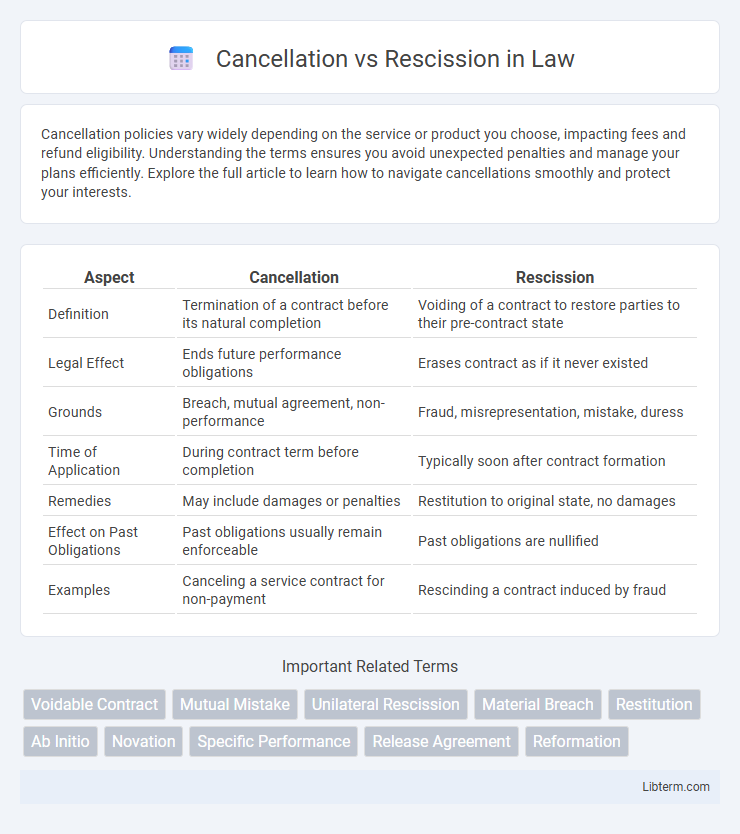Cancellation policies vary widely depending on the service or product you choose, impacting fees and refund eligibility. Understanding the terms ensures you avoid unexpected penalties and manage your plans efficiently. Explore the full article to learn how to navigate cancellations smoothly and protect your interests.
Table of Comparison
| Aspect | Cancellation | Rescission |
|---|---|---|
| Definition | Termination of a contract before its natural completion | Voiding of a contract to restore parties to their pre-contract state |
| Legal Effect | Ends future performance obligations | Erases contract as if it never existed |
| Grounds | Breach, mutual agreement, non-performance | Fraud, misrepresentation, mistake, duress |
| Time of Application | During contract term before completion | Typically soon after contract formation |
| Remedies | May include damages or penalties | Restitution to original state, no damages |
| Effect on Past Obligations | Past obligations usually remain enforceable | Past obligations are nullified |
| Examples | Canceling a service contract for non-payment | Rescinding a contract induced by fraud |
Understanding Cancellation and Rescission
Cancellation terminates a contract to prevent future obligations, often due to breach or mutual agreement, leaving past performance valid. Rescission voids a contract from its inception, treating it as though it never existed, typically due to fraud, misrepresentation, or mistake. Understanding cancellation involves recognizing its effect on ongoing duties, while rescission focuses on restoring parties to their pre-contractual positions.
Key Legal Definitions
Cancellation refers to the annulment of a contract, rendering it void from the moment of cancellation, while rescission is the legal revocation of a contract, restoring the parties to their original positions as if the contract never existed. Cancellation typically addresses future obligations, preventing enforcement, whereas rescission voids past actions and obligations under the contract. Both concepts involve invalidating agreements, but rescission often requires mutual consent or court approval due to its restorative nature.
Fundamental Differences Explained
Cancellation terminates an agreement's obligations and rights from the moment of cancellation, often due to a breach or failure to perform, without undoing the contract's existence. Rescission nullifies the contract retroactively, treating it as if it never existed, typically due to factors like fraud, misrepresentation, or mutual mistake. The fundamental difference lies in cancellation preserving past effects up to the cancellation point, while rescission erases all contractual effects from inception.
Grounds for Cancellation
Grounds for cancellation typically involve breaches of contract, misrepresentation, or fraud, enabling one party to terminate the agreement due to non-fulfillment or invalidity. Cancellation is often invoked when the contract remains executory and aims to release parties from future obligations without undoing past performances. In contrast, rescission nullifies the contract from inception due to factors like mutual mistake or duress, effectively restoring parties to their original positions before the contract existed.
Grounds for Rescission
Grounds for rescission typically include fraud, misrepresentation, duress, undue influence, or mutual mistake, which justify undoing a contract to restore parties to their original positions. Unlike cancellation, which may terminate contracts for breach or stipulated reasons without nullifying the agreement's existence, rescission nullifies the contract ab initio due to inherent defects in consent or formation. Courts scrutinize the circumstances surrounding contract execution to ensure rescission is warranted by equitable principles rooted in the validity and fairness of the agreement.
Legal Effects and Consequences
Cancellation terminates a contract from the point of breach forward, leaving the parties responsible for obligations accrued prior to cancellation; the contract is considered void only for future duties, allowing recovery for damages caused by the breach. Rescission nullifies the contract ab initio, restoring both parties to their original positions as if the contract never existed, often used in cases involving fraud, misrepresentation, or mutual mistake. Legal consequences of rescission include undoing all benefits exchanged and reversing property transfers, whereas cancellation permits enforcement of rights and claims stemming from the contract's valid period before termination.
Real-World Examples
Cancellation involves terminating a contract before performance, such as a customer canceling a gym membership due to relocation, while rescission voids the contract from inception, exemplified by a buyer rescinding a house purchase after discovering undisclosed structural defects. In real estate, cancellation might occur when a buyer backs out during the inspection period, but rescission often follows fraud or misrepresentation, nullifying obligations as if the contract never existed. Courts typically require proof of material misrepresentation or mutual mistake for rescission, whereas cancellation can happen by mutual agreement or under contract terms.
Practical Considerations for Parties
Cancellation terminates a contract and releases parties from future obligations, often following a breach or mutual agreement, while rescission voids the contract retroactively, restoring parties to their pre-contract positions. Practical considerations for parties include the timing and legal grounds required, as rescission may demand proving misrepresentation or fraud, whereas cancellation can be triggered by specific contractual terms or breaches. Parties must assess potential damages, costs of reversing transactions, and the impact on ongoing obligations when choosing between cancellation and rescission.
How Courts Determine Remedies
Courts determine remedies for cancellation and rescission by evaluating the nature of the contract breach and the intent of the parties involved. Cancellation generally terminates future obligations under the contract without voiding past performances, while rescission restores parties to their positions before the contract was made, effectively voiding the agreement. Judicial decisions rely on the presence of misrepresentation, fraud, mutual consent, or mistake to decide whether to grant cancellation or rescission as equitable remedies.
Choosing the Right Legal Path
Choosing between cancellation and rescission depends on the nature of the contractual breach and desired remedy. Cancellation typically terminates an agreement to prevent future obligations, while rescission voids the contract from its inception, restoring parties to their pre-contractual positions. Legal professionals assess factors such as contract terms, breach severity, and equitable considerations to determine the most effective course of action.
Cancellation Infographic

 libterm.com
libterm.com